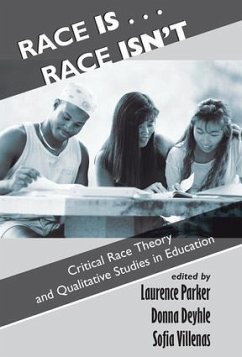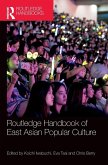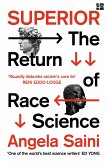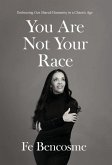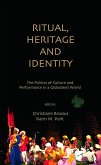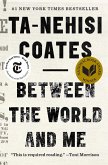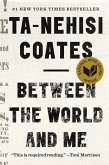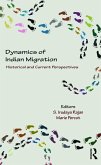- Gebundenes Buch
- Merkliste
- Auf die Merkliste
- Bewerten Bewerten
- Teilen
- Produkt teilen
- Produkterinnerung
- Produkterinnerung
"The field of critical race theory has gotten increasingly more attention as an emerging perspective on race, the law, and policy. Critical race theory examines the social construction of the law, admi"
Andere Kunden interessierten sich auch für
![Routledge Handbook of East Asian Popular Culture Routledge Handbook of East Asian Popular Culture]() Routledge Handbook of East Asian Popular Culture284,99 €
Routledge Handbook of East Asian Popular Culture284,99 €![Superior Superior]() Angela SainiSuperior8,99 €
Angela SainiSuperior8,99 €![You Are Not Your Race You Are Not Your Race]() Fe BencosmeYou Are Not Your Race20,99 €
Fe BencosmeYou Are Not Your Race20,99 €![Ritual, Heritage and Identity Ritual, Heritage and Identity]() Ritual, Heritage and Identity180,99 €
Ritual, Heritage and Identity180,99 €![Between the World and Me Between the World and Me]() Ta-Nehisi CoatesBetween the World and Me9,49 €
Ta-Nehisi CoatesBetween the World and Me9,49 €![Between the World and Me Between the World and Me]() Ta-Nehisi CoatesBetween the World and Me19,99 €
Ta-Nehisi CoatesBetween the World and Me19,99 €![Dynamics of Indian Migration Dynamics of Indian Migration]() Dynamics of Indian Migration187,99 €
Dynamics of Indian Migration187,99 €-
-
-
"The field of critical race theory has gotten increasingly more attention as an emerging perspective on race, the law, and policy. Critical race theory examines the social construction of the law, admi"
Hinweis: Dieser Artikel kann nur an eine deutsche Lieferadresse ausgeliefert werden.
Hinweis: Dieser Artikel kann nur an eine deutsche Lieferadresse ausgeliefert werden.
Produktdetails
- Produktdetails
- Verlag: Taylor & Francis
- Seitenzahl: 296
- Erscheinungstermin: 7. Mai 1999
- Englisch
- Abmessung: 236mm x 161mm x 30mm
- Gewicht: 563g
- ISBN-13: 9780813390697
- ISBN-10: 0813390699
- Artikelnr.: 22275441
- Herstellerkennzeichnung
- Libri GmbH
- Europaallee 1
- 36244 Bad Hersfeld
- gpsr@libri.de
- Verlag: Taylor & Francis
- Seitenzahl: 296
- Erscheinungstermin: 7. Mai 1999
- Englisch
- Abmessung: 236mm x 161mm x 30mm
- Gewicht: 563g
- ISBN-13: 9780813390697
- ISBN-10: 0813390699
- Artikelnr.: 22275441
- Herstellerkennzeichnung
- Libri GmbH
- Europaallee 1
- 36244 Bad Hersfeld
- gpsr@libri.de
"Laurence Parker is an associate professor in the department of educational policy studies at the University of Illinois at Urbana-Champaign. His current research and teaching interests are in the areas of critical race theory and educational policy research and analysis (at the K-12 and postsecondary levels), and the politics of school choice. His most recent article, entitled ""Race is ... race ain't: An exploration of the utility of critical race theory in qualitative research in education,"" appeared in the International Journal of Qualitative Studies in Education. Donna Deyhle is a professor of anthropology and education in the department of educational studies and in the ethnic studies program at the University of Utah, where she is also co-director of the American Indian Resource Center. She is a leading scholar in the area of American Indian educational research, and her work has appeared in the Harvard Educational Review, the Journal oj American Indian Education, Youth and Society, and the Review of Research in Education. Her research also has been an integral part of the litigation surrounding the Navajo conflicts with Anglo school officials in southern Utah. Prof. Deyhle is a former Spencer Fellow of the National Academy of Education. Sofia Villenas is an assistant professor in the department of educational studies and in the ethnic studies program at the University of Utah. Her research centers on investigating Latino schooling and home and community education within the dynamics of racial/cultural community politics. Critical race theory informs this work, as is evident in her article co-authored with Donna Deyhle entitled ""Critical race theory and ethnographies challenging the stereotypes: Latino families, schooling, resilience and resistance,"" forthcoming in Curriculum Inquiry. As a Chicana ethnographer, Villenas also explores positionality and locality in qualitative research, as can be seen in her article ""The colonizer/colonized Chicana ethnographer: Identity, marginalization, and co-optation in the field,"" in the Harvard Educational Review. She is also a former Spencer Fellow of the National Academy of Education. "
Acknowledgments
Introduction to Critical Race Theory in Educational Research and Praxis
Just What Is Critical Race Theory and What's It Doing in a Nice Field Like Education?
Critical Race Theory and Praxis: Chicano(a)/Latino(a) and Navajo Struggles for Dignity
Educational Equity
and Social Justice
"¡Adelante!": Toward Social Justice and Empowerment in Chicana / o Communities and Chicana / o Studies
Research Methods as a Situated Response: Toward a First Nations' Methodology
Toward a Definition of a Latino Family Research Paradigm
Formations of Mexicananess: Trenzas de identidades múltiples (Growing Up Mexicana: Braids of Multiple Identities)
Race
Class
Gender
and Classroom Discourse
Critical Race Theory and Interest Convergence in the Desegregation of Higher Education
Negotiating Borders of Consciousness in the Pursuit of Education: Identity Politics and Gender of Second-Generation Korean American Women
Separate and Still Unequal: Legal Challenges to School Tracking and Ability Grouping in America's Public Schools
Conclusion
About the Editors and Contributors
Index
Introduction to Critical Race Theory in Educational Research and Praxis
Just What Is Critical Race Theory and What's It Doing in a Nice Field Like Education?
Critical Race Theory and Praxis: Chicano(a)/Latino(a) and Navajo Struggles for Dignity
Educational Equity
and Social Justice
"¡Adelante!": Toward Social Justice and Empowerment in Chicana / o Communities and Chicana / o Studies
Research Methods as a Situated Response: Toward a First Nations' Methodology
Toward a Definition of a Latino Family Research Paradigm
Formations of Mexicananess: Trenzas de identidades múltiples (Growing Up Mexicana: Braids of Multiple Identities)
Race
Class
Gender
and Classroom Discourse
Critical Race Theory and Interest Convergence in the Desegregation of Higher Education
Negotiating Borders of Consciousness in the Pursuit of Education: Identity Politics and Gender of Second-Generation Korean American Women
Separate and Still Unequal: Legal Challenges to School Tracking and Ability Grouping in America's Public Schools
Conclusion
About the Editors and Contributors
Index
Acknowledgments
Introduction to Critical Race Theory in Educational Research and Praxis
Just What Is Critical Race Theory and What's It Doing in a Nice Field Like Education?
Critical Race Theory and Praxis: Chicano(a)/Latino(a) and Navajo Struggles for Dignity
Educational Equity
and Social Justice
"¡Adelante!": Toward Social Justice and Empowerment in Chicana / o Communities and Chicana / o Studies
Research Methods as a Situated Response: Toward a First Nations' Methodology
Toward a Definition of a Latino Family Research Paradigm
Formations of Mexicananess: Trenzas de identidades múltiples (Growing Up Mexicana: Braids of Multiple Identities)
Race
Class
Gender
and Classroom Discourse
Critical Race Theory and Interest Convergence in the Desegregation of Higher Education
Negotiating Borders of Consciousness in the Pursuit of Education: Identity Politics and Gender of Second-Generation Korean American Women
Separate and Still Unequal: Legal Challenges to School Tracking and Ability Grouping in America's Public Schools
Conclusion
About the Editors and Contributors
Index
Introduction to Critical Race Theory in Educational Research and Praxis
Just What Is Critical Race Theory and What's It Doing in a Nice Field Like Education?
Critical Race Theory and Praxis: Chicano(a)/Latino(a) and Navajo Struggles for Dignity
Educational Equity
and Social Justice
"¡Adelante!": Toward Social Justice and Empowerment in Chicana / o Communities and Chicana / o Studies
Research Methods as a Situated Response: Toward a First Nations' Methodology
Toward a Definition of a Latino Family Research Paradigm
Formations of Mexicananess: Trenzas de identidades múltiples (Growing Up Mexicana: Braids of Multiple Identities)
Race
Class
Gender
and Classroom Discourse
Critical Race Theory and Interest Convergence in the Desegregation of Higher Education
Negotiating Borders of Consciousness in the Pursuit of Education: Identity Politics and Gender of Second-Generation Korean American Women
Separate and Still Unequal: Legal Challenges to School Tracking and Ability Grouping in America's Public Schools
Conclusion
About the Editors and Contributors
Index

